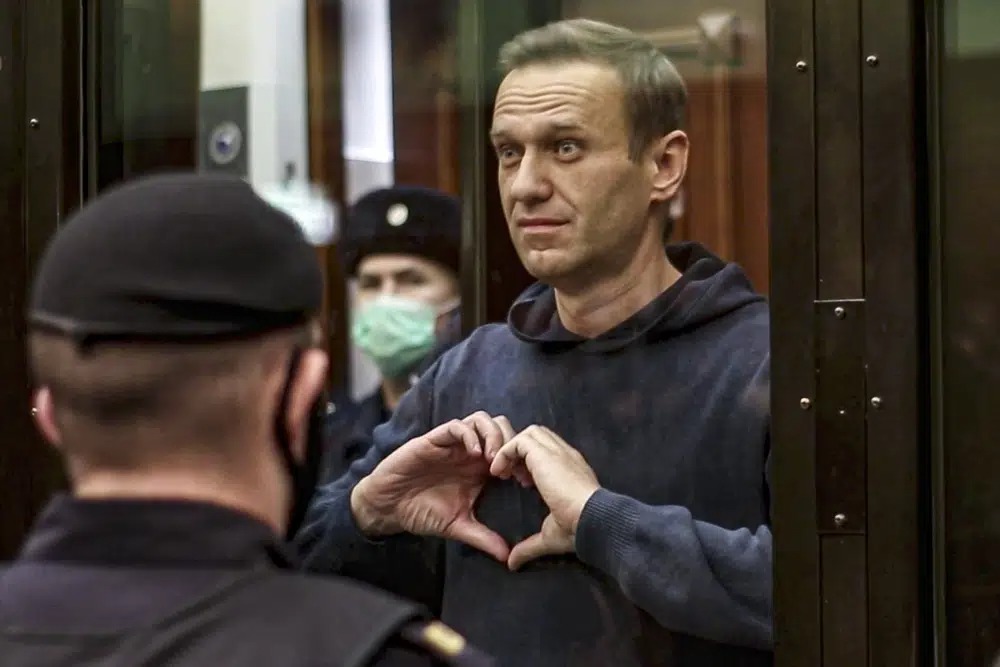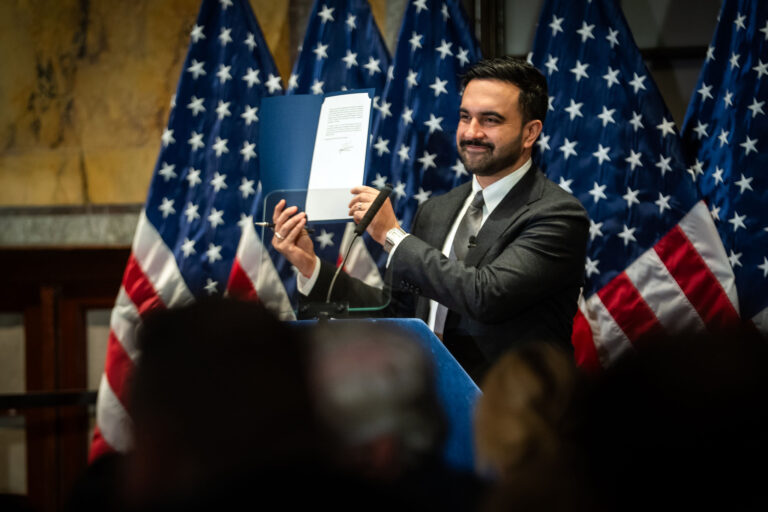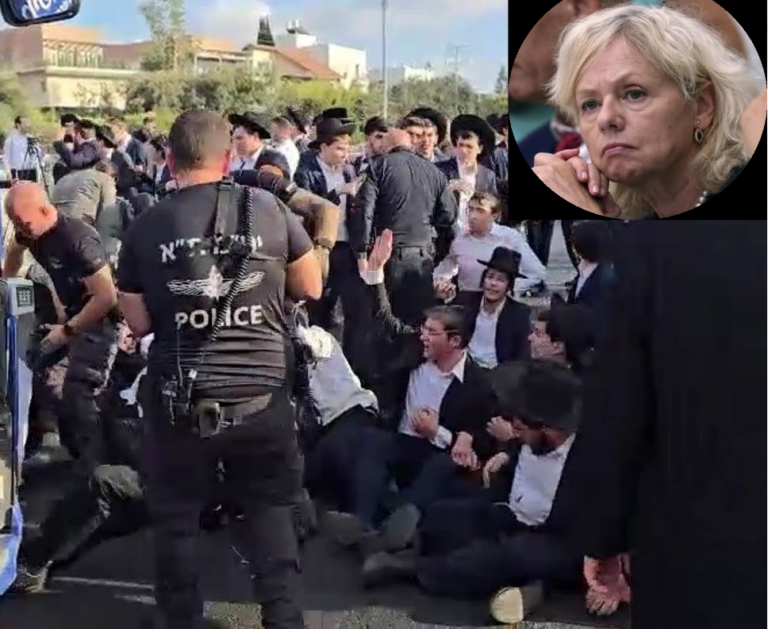When Alexei Navalny turns 47 on Sunday, he’ll wake up in a bare concrete cell with hardly any natural light.
He won’t be able to see or talk to any of his loved ones. Phone calls and visits are banned for those in “punishment isolation” cells, a 2-by-3-meter (6 1/2-by-10-foot) space. Guards usually blast patriotic songs and speeches by President Vladimir Putin at him.
“Guess who is the champion of listening to Putin’s speeches? Who listens to them for hours and falls asleep to them?” Navalny said recently in a typically sardonic social media post via his attorneys from Penal Colony No. 6 in the Vladimir region east of Moscow.
He is serving a nine-year term due to end in 2030 on charges widely seen as trumped up, and is facing another trial on new charges that could keep him locked up for another two decades. Rallies have been called for Sunday in Russia to support him.
Navalny has become Russia’s most famous political prisoner — and not just because of his prominence as Putin’s fiercest political foe, his poisoning that he blames on the Kremlin, and his being the subject of an Oscar-winning documentary.
He has chronicled his arbitrary placement in isolation, where he has spent almost six months. He’s on a meager prison diet, restricted on how much time he can spend writing letters and forced at times to live with a cellmate with poor personal hygiene, making life even more miserable.
Most of the attention goes to Navalny and other high-profile figures like Vladimir Kara-Murza, who was sentenced last month to 25 years on treason charges. But there’s a growing number of less-famous prisoners who are serving time in similarly harsh conditions.
Memorial, Russia’s oldest and most prominent human rights organization and a 2022 Nobel Peace Prize laureate, counted 558 political prisoners in the country as of April — more than three times the figure than in 2018, when it listed 183.
The Soviet Union’s far-flung gulag system of prison camps provided inmate labor to develop industries such as mining and logging. While conditions vary among modern-day penal colonies, Russian law still permits prisoners to work on jobs like sewing uniforms for soldiers.
In a 2021 report, the U.S. State Department said conditions in Russian prisons and detention centers “were often harsh and life threatening. Overcrowding, abuse by guards and inmates, limited access to health care, food shortages and inadequate sanitation were common in prisons, penal colonies, and other detention facilities.”
Andrei Pivovarov, an opposition figure sentenced last year to four years in prison, has been in isolation at Penal Colony No. 7 in northern Russia’s Karelia region since January and is likely to stay there the rest of this year, said his partner, Tatyana Usmanova. The institution is notorious for its harsh conditions and reports of torture.
The 41-year-old former head of the pro-democracy group Open Russia spends his days alone in a small cell in a “strict detention” unit, and is not allowed any calls or visits from anyone but his lawyers, Usmanova told The Associated Press. He can get one book from the prison library, can write letters for several hours a day and is permitted 90 minutes outdoors, she said.
Other inmates are prohibited from making eye contact with Pivovarov in the corridors, contributing to his “maximum isolation,” she said.
“It wasn’t enough to sentence him to a real prison term. They are also trying to ruin his life there,” Usmanova added.
Pivovarov was pulled off a Warsaw-bound flight just before takeoff from St. Petersburg in May 2021 and taken to the southern city of Krasnodar. Authorities accused him of engaging with an “undesirable” organization -– a crime since 2015.
Several days before his arrest, Open Russia had disbanded after getting the “undesirable” label.
After his trial in Krasnodar, the St. Petersburg native was convicted and sentenced in July, when Russia’s war in Ukraine and Putin’s sweeping crackdown on dissent were in full swing.
He told AP in a letter from Krasnodar in December that authorities moved him there “to hide me farther away” from his hometown and Moscow. That interview was one of the last Pivovarov was able to give, describing prison life there as “boring and depressing,” with his only diversion being an hour-long walk in a small yard. “Lucky” inmates with cash in their accounts can shop at a prison store once a week for 10 minutes but otherwise must stay in their cells, he wrote.
Letters from supporters lift his spirits, he said. Many people wrote that they used to be uninterested in Russian politics, according to Pivovarov, and “only now are starting to see clearly.”
Now, any letters take weeks to arrive, Usmanova said.
Conditions are easier for some less-famous political prisoners like Alexei Gorinov, a former member of a Moscow municipal council. He was was convicted of “spreading false information” about the army in July over antiwar remarks he made at a council session.
Criticism of the invasion was criminalized a few months earlier, and Gorinov, 61, became the first Russian sent to prison for it, receiving seven years.
He is housed in barracks with about 50 others in his unit at Penal Colony No. 2 in the Vladimir region, Gorinov said in written answers passed to AP in March.
The long sentence for a low-profile activist shocked many, and Gorinov said “authorities needed an example they could showcase to others (of) an ordinary person, rather than a public figure.”
Inmates in his unit can watch TV, and play chess, backgammon or table tennis. There’s a small kitchen to brew tea or coffee between meals, and they can have food from personal supplies.
But Gorinov said prison officials still carry out “enhanced control” of the unit, and he and two other inmates get special checks every two hours, since they’ve been labeled “prone to escape.”
There is little medical help, he said.
“Right now, I’m not feeling all that well, as I can’t recover from bronchitis,” he said, adding that he needed treatment for pneumonia last winter at another prison’s hospital ward, because at Penal Colony No. 2, the most they can do is “break a fever.”
Also suffering health problems is artist and musician Sasha Skochilenko, who is detained amid her ongoing trial following her April 2022 arrest in St. Petersburg, also on charges of spreading false information about the army. Her crime was replacing supermarket price tags with antiwar slogans in protest.
Skochilenko has a congenital heart defect and celiac disease, requiring a gluten-free diet. She gets food parcels weekly, but there is a weight limit, and the 32-year-old can’t eat “half the things they give her there,” said her partner, Sophia Subbotina.
There’s a stark difference between detention facilities for women and men, and Skochilenko has it easier in some ways than male prisoners, Subbotina said.
“Oddly enough, the staff are mostly nice. Mostly they are women, they are quite friendly, they will give helpful tips and they have a very good attitude toward Sasha,” Subbotina told AP by phone.
“Often they support Sasha, they tell her: ‘You will definitely get out of here soon, this is so unfair here.’ They know about our relationship and they are fine with it. They’re very humane,” she said.
There’s no political propaganda in the jail and dance music blares from a radio. Cooking shows play on TV. Skochilenko “wouldn’t watch them in normal life, but in jail, it’s a distraction,” Subbotina said.
She recently arranged for an outside cardiologist to examine Skochilneko and since March has been allowed to visit her twice a month.
Subbotina gets emotional when she recalled their first visit.
“It is a complex and weird feeling when you’ve been living with a person. Sasha and I have been together for over six years — waking up with them, falling asleep with them — then not being able to see them for a year,” she said. “I was nervous when I went to visit her. I didn’t know what I would say to Sasha, but in the end, it went really well.”
Still, Subbotina said a year behind bars has been hard on Skochilenko. The trial is moving slowly, unlike usually swift proceedings for high-profile political activists, with guilty verdicts almost a certainty.
Skochilenko faces up to 10 years if convicted.
(AP)











